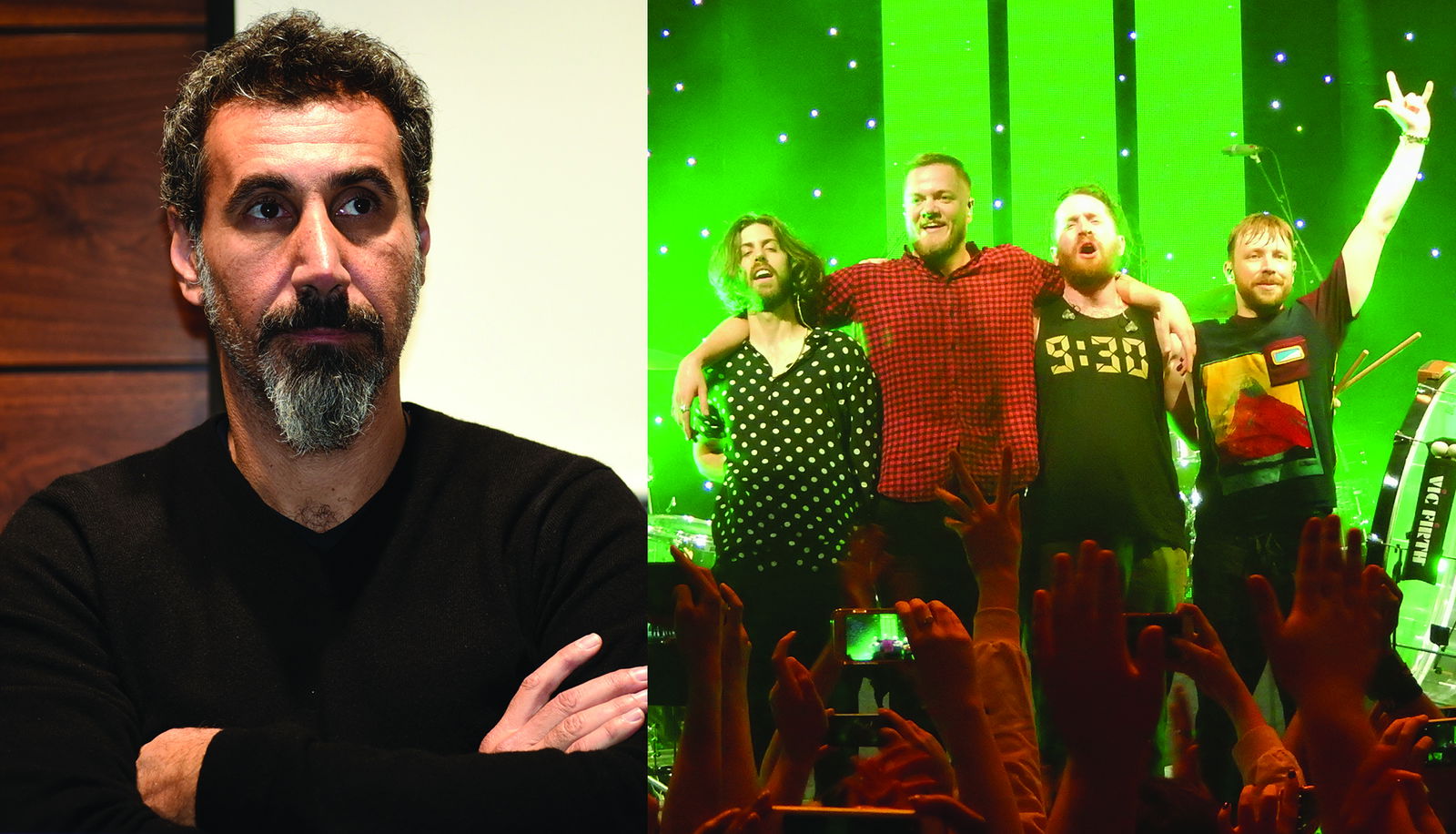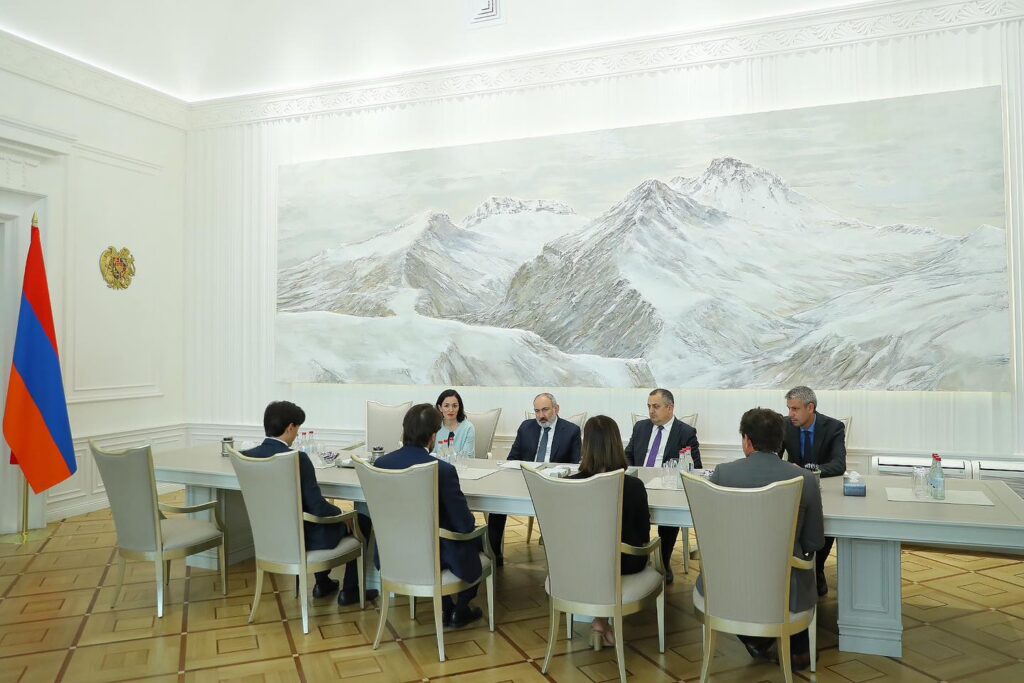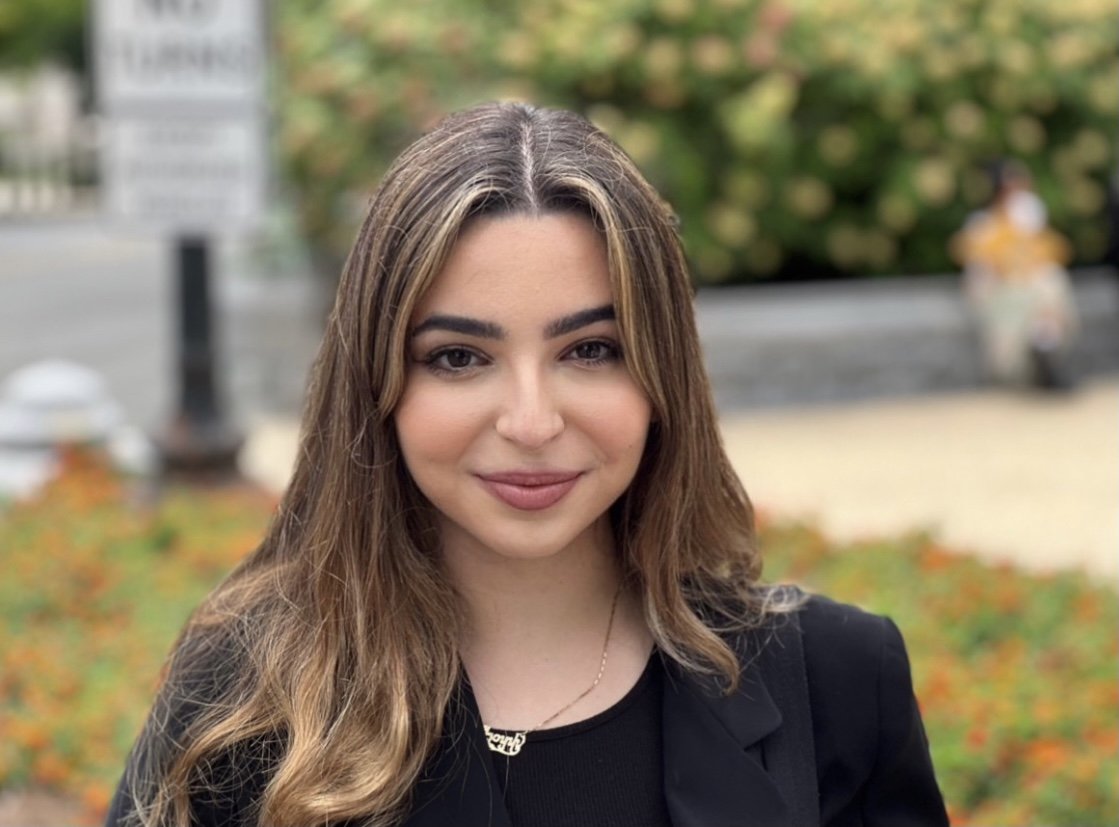
Serj Tankian and Imagine Dragons, 2017 (Wikimedia Commons)
Serj Tankian, frontman of the renowned Armenian-American heavy metal band System of a Down, publicly criticized Imagine Dragons for their planned concert in Baku, Azerbaijan on September 2, 2023, with which the band eventually did follow through. The debate was revived following a Rolling Stone interview in July with Imagine Dragons’ frontman, Dan Reynolds, during which he defended playing the concert in Baku.
Tankian’s initial criticism in 2023 came amid the humanitarian crisis in the dissolved Republic of Artsakh (Nagorno-Karabakh), where the Azerbaijani government conducted a campaign of ethnic cleansing that involved blockading 120,000 Artsakhtsis — including children and the elderly — without food, medicine, internet access, electricity and gas in severe winter weather conditions.
Following the 10-month blockade, Azerbaijan forcibly removed the Artsakh Armenians, thereafter taking control of the area. Over 100,000 Artsakhtsis fled their centuries-old homeland. For the first time in over 2,000 years, Artsakh had no Armenians.
The situation was — and remains — dire, with many international organizations officially speaking out in support of the Armenian population. This includes the Lemkin Institute for Genocide Prevention and Human Rights Watch, among others.
Imagine Dragons, a globally successful pop-rock band with over 74 billion streams, numerous platinum records and a multitude of music awards, including a Grammy award, was urged by Tankian to reconsider their performance.
In his original public message on Instagram in 2023, Tankian wrote that he “was sure they were unaware that Azerbaijan’s petro-oligarchic dictatorial regime was starving 120k people in Nagorno-Karabagh which is now being called a genocide by the former prosecutor of the International Criminal Court, Luis Moreno Ocampo.”
He stated that he attempted to reach out to Imagine Dragons through their representatives, sending them a “kind letter urging them to reconsider playing their show in Azerbaijan as it would help whitewash the dictatorial regime’s image there.” Tankian even went on to include various informational articles, including one by Amnesty International.
Tankian said he was told that the band had worked with Amnesty in the past. This is true, as the band was a headliner for Amnesty International’s 2014 “Bringing Human Rights Home” concert in New York. The human rights organization is a staunch critic of Azerbaijan and its President Ilham Aliyev, having highlighted the blockade, the lack of journalists’ rights and other human rights abuses.
Imagine Dragons did not respond to Tankian’s letter, prompting him to go public with his concerns. He continued, writing:
As the humanitarian crisis worsens in Nagorno-Karabagh with starvation already being recorded, I am forced to publicize this letter and their disregard for this humanitarian catastrophe. Maybe they felt they had a legal liability to play the show, maybe they just don’t care. My whole life I have been an advocate for genocide recognition and have always said there has to be a price to pay for genocidal regimes or deniers. Another genocide is looming by Azerbaijan and while this happens they get to enjoy an American band from LV. F**k that!
That’s not right.
Go to my profile to sign a petition to the band on change.org if you care to sign and you can see my letter to the band on my Facebook page.
Thanks for reading. Serj
The petition Tankian referenced presently has 19,421 signatures, but was left unacknowledged by Imagine Dragons, who did play their show as originally planned.
Tankian went on to interview with Metal Hammer magazine, where he stated that although he is not one to tell bands where or where not to play, there are certain conditions under which he must draw the line: “When there’s a government that’s about to commit ethnic cleansing, when Azerbaijan was starving the 120,000 Armenians in Nagorno-Karabakh, and not allowing any food or medicine in…you know, as an artist, if I found that out, there is no f***ing way I could have gone and played that show. But some artists do. And I don’t know what to say about those artists. I don’t respect them as human beings. F**k their art, they’re not good human beings, as far as I’m concerned.”
He went on to state that he has “zero respect for those guys” for playing the show, and that it is not about his ego but about making a positive change.
He continued:
I wanted those guys to know that what they’re about to do is going to have bad repercussions. I was warning them for their own sake, for their own morality.
I’ve been warning different organizations against using Azerbaijan as a venue because, again, if you allow them to have international links in a way where they feel like they’re legitimate, they’re going to continue their bad behaviour.
You have a dictator who is doing ethnic cleansing, and he’s getting more contracts, Formula 1 racing and rock shows, then he’s going to think that it’s okay to kill people. That’s not okay. So you’ve got to break that link, you’ve got to let people know.
On July 2 this year, Rolling Stone released an interview with Reynolds. The magazine asked him about the widespread criticism Imagine Dragons received for their concert in Azerbaijan, as well as in Israel. He said that he does not believe in depriving fans who want to see them play because of their leaders and governments’ actions. He called it “a really slippery slope,” stating that there are corrupt leaders and warmongers everywhere. “Where do you draw the line?” he asked.
Rolling Stone specifically asked Reynolds about Tankian’s statement that he didn’t “respect them as human beings” for playing in Azerbaijan, to which he gave the same general response: “I think I just said it. It’s a slippery slope, and I’m never going to deprive our fans of playing for them.”
It is important to note that Imagine Dragons canceled their shows in Kiev and Moscow, posting a since-deleted image of the Ukrainian flag on Instagram with the accompanying caption, “In light of recent events, we’re sad to announce our Russia and Ukraine shows are cancelled until further notice. Our thoughts are with Ukraine and all others suffering from this needless war.”
The band also took on the role of ambassadors for humanitarian organization UNITED24, a Ukrainian government-run fundraising platform to raise money for Ukraine in the Russo-Ukrainian War. They have worked alongside Ukraine’s First Lady Olena Zelenska on a fundraiser for ambulance supplies.
In a statement, Reynolds said, “We love the people of Ukraine and want to help in any way possible. Injustices like this can only be conquered when people around the world come together. We stand by the beautiful people of Ukraine and their courageous leader President Zelensky. We will work with UNITED24 and local leaders to continually find ways to raise awareness and funds for the people until this unjust war ends. We look forward to the day when we can play a concert again in Kyiv and celebrate freedom, life and music with the resilient and strong people of Ukraine.”
The band even removed their discography from the Russian market. As it turns out, this “slippery slope” that Reynolds mentioned is a selective one. While he celebrates people coming together to conquer injustices in the case of Ukraine, that very same idea is not relevant — or, as implied, precarious or unfair — to other situations around the world.
Tankian was quick to respond to Reynolds’ Rolling Stone interview on July 5 on social media, writing:
Dan Reynolds stated: “I don’t believe in depriving our fans who want to see us play because of the acts of their leaders and their governments, I think that’s a really slippery slope. I think the second you start to do that, there’s corrupt leaders and warmongers all over the world, and where do you draw the line?”
Respectfully, I draw the line at ethnic cleansing and genocide. Azerbaijan’s dictatorship with popular support was already into a 9-month starvation blockade of Nagorno-Karabagh qualified as genocide by former @icc prosecutor @luismorenoocampo when they decided to play Baku. Would they play in Nazi Germany? Why don’t they want to play in Russia? Because it’s not popular?
They support Ukraine but not Armenians of Artsakh? The only “slippery slope” is the farce moral equivalency at the heart of this hypocritical attitude. I have nothing against this guy nor his band. I just hate artists being taken advantage of to whitewash genocidal dictatorships.
Reynolds and other members from Imagine Dragons have not responded to this statement, but it is evident where their priorities lie. While they publicly denounce their Russian fans (arguably “depriving” fans of their music, in Reynolds’ words) and embrace Ukraine, going above and beyond for the country in terms of fundraisers and other aforementioned steps, that same train of thought is not applicable in the case of Azerbaijan, Artsakh and Armenia.
Rolling Stone Australia covered Tankian’s response to Reynold’s interview on July 8. According to the article, a representative for Imagine Dragons did not immediately respond to the magazine’s request for comment.
Whether the band will properly address Tankian’s concerns — in line with their activism for Ukraine — remains to be seen, but this public debate within the music industry has undoubtedly brought global attention to artists’ responsibilities in the face of human rights abuses.
Author information
Melody Seraydarian
Melody Seraydarian is a journalist and undergraduate student at the University of California, Berkeley, pursuing a degree in Media Studies with a concentration in media, law and policy. Her column, “Hye Key,” covers politics, culture and everything in between from a Gen-Z perspective. She is from Los Angeles, California and is an active member of her local Armenian community.
|
The post Serj Tankian criticizes Imagine Dragons’ performance in Azerbaijan, cites country’s human rights abuses appeared first on The Armenian Weekly.


 Sima Setian Pariseau and Dylan Pariseau at the St. Gregory Father’s Day picnic, June 16, 2024
Sima Setian Pariseau and Dylan Pariseau at the St. Gregory Father’s Day picnic, June 16, 2024 
 Serj Tankian and Imagine Dragons, 2017 (Wikimedia Commons)
Serj Tankian and Imagine Dragons, 2017 (Wikimedia Commons)
